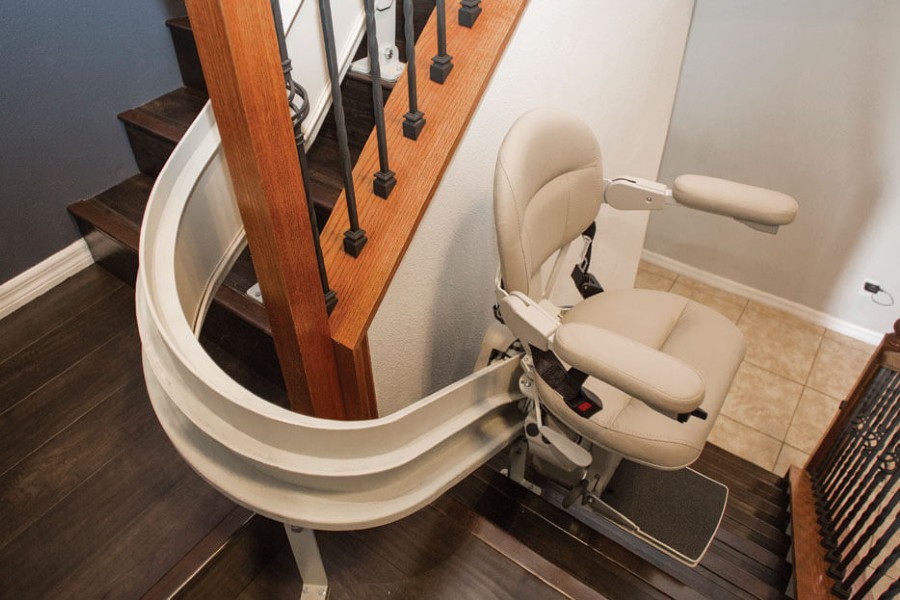
One of the most common questions asked by seniors or those with mobility impairments is, “Does Medicare cover stairlifts?”
Stairlifts can be a vital home modification for many, providing increased accessibility within their homes. This article will delve into the subject, exploring what Medicare covers, the situations where coverage might apply, and alternative ways to finance a stairlift if Medicare does not provide support.
Understanding Medicare
Medicare is a federal program that provides health insurance to individuals aged 65 and older or those with certain disabilities. It’s divided into several parts, each covering different aspects of healthcare:
- Part A: Hospital Insurance
- Part B: Medical Insurance
- Part C: Medicare Advantage
- Part D: Prescription Drug Coverage
The question, “Does Medicare cover stairlifts?” mostly revolves around Part B, which covers certain outpatient medical services and equipment.
Does Medicare Cover Stairlifts? The General Rule
In most cases, Medicare’s standard benefits do not include coverage for the purchase or installation of stairlifts. It is more common practise to refer to stairlifts as “home modifications” rather than “durable medical equipment.” Although Medicare Part B does provide coverage for a variety of medical devices that a doctor may determine to be essential for a patient, such as wheelchairs or walkers, the programme does not normally include equipment that is used for accessibility in the environment, such as stairlifts.
Exceptions and Special Considerations
While it’s true that Medicare doesn’t pay for stairlifts as a matter of course, there are a few exceptions to this regulation that could result in financial assistance being made available:
1. Medicare Advantage Plans (Part C): There is a possibility that some Medicare Advantage plans will offer additional benefits in addition to the coverage provided by normal Medicare. These plans are provided by private insurance firms, and the coverage they provide can vary greatly from one another. It is in your best interest to check with each individual provider to determine whether or not stairlifts are offered as an additional benefit.
2. Programmes of Assistance Offered by the State Some states offer particular programmes that are geared to assist seniors and those with disabilities in making adjustments to their homes. These state-level programmes, which are not covered by Medicare, may provide the necessary funds or subsidies for stairlifts, but Medicare does not.
3. A prescription from a physician If a healthcare provider determines that a stairlift is required for a patient’s medical condition, there may be some options for partial coverage or payment through other channels, despite the fact that this scenario is extremely uncommon.
Alternative Ways to Finance a Stairlift
Since the answer to “Does Medicare cover stairlifts?” is typically no, it’s essential to explore alternative financing options. Here are some possibilities:
1. Benefits for Veterans If you are a veteran, you may be eligible for grants or programmes that might aid you in making adaptations to your house, including the installation of stairlifts.
2. Medicaid: If you live in a state that participates in the Home and Community-Based Services (HCBS) waiver programme or one of the many other Medicaid special programmes, stairlifts may be covered by Medicaid at no cost to you.
3. Non-Profit Organisations: In order to assist senior citizens and people with disabilities, several non-profit organisations offer financial assistance in the form of grants or discounts on house improvements.
4. Property Equity Loans or Reverse Mortgages: Leveraging the value of your property as collateral for a loan could be an option for financing the installation of a stairlift.
5. Manufacturer Financing: Some stairlift manufacturers or dealers provide financing programmes or refurbished units at lower prices. These options can be found under number 5 on this list.
6. Long-Term Care Insurance: If you have long-term care insurance, it may cover some home improvements, such as installing a stairlift, depending on the specifics of your coverage.
Consultation and Professional Guidance
Given the complexity of healthcare coverage and the various programs that might apply, consulting with a healthcare or financial professional who understands your unique situation is wise. They can guide you through the options available in your state and help you determine the best course of action to finance a stairlift.
Conclusion
The question “Does Medicare cover stairlifts?” highlights a critical gap in support for seniors and those with mobility challenges looking to age in place. While the general answer is no, various other funding sources might provide the necessary financial assistance for a stairlift.
By exploring alternative financing options, consulting with professionals, and thoroughly investigating available state programs, grants, or additional insurance coverage, individuals can find ways to make their homes more accessible.
Investing in a stairlift can significantly enhance the quality of life, providing the freedom and independence to navigate one’s home comfortably and safely. While it’s disappointing that Medicare doesn’t typically cover stairlifts service in Philadelphia, pathways are still available to make this essential home modification a reality.
- Harlem’s Claremont Inn, Home Of Presidents, Dukes, Princes, A Princess’s And Others, 1804
- Southampton: Year-Round Charm, Business Leaders Unite To Energize Southampton’s Economy
- What’s Up Miss Lil: Harlem Cultural Festival Foundation Celebrates 55 Years Of Soul
- What’s Up Miss Lil: 2024 NYC Marathon Journey Through Harlem
- Mayor Adams Announces City Hall And Buildings To Shine Green For Youth
Become a Harlem Insider!
By submitting this form, you are consenting to receive marketing emails from: . You can revoke your consent to receive emails at any time by using the SafeUnsubscribe® link, found at the bottom of every email. Emails are serviced by Constant Contact









